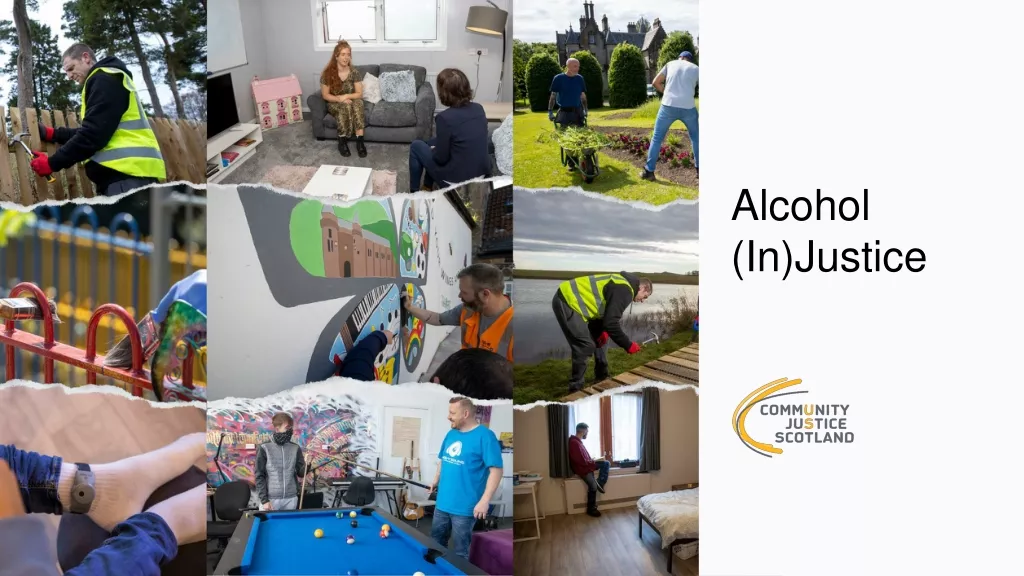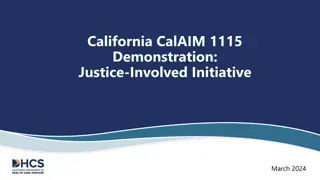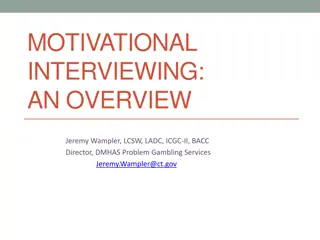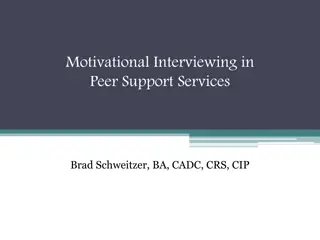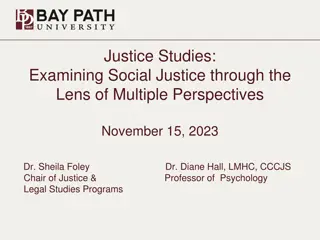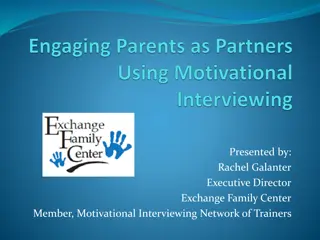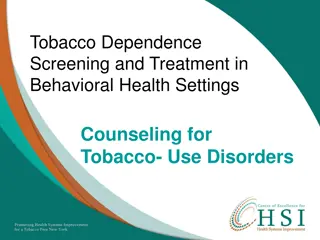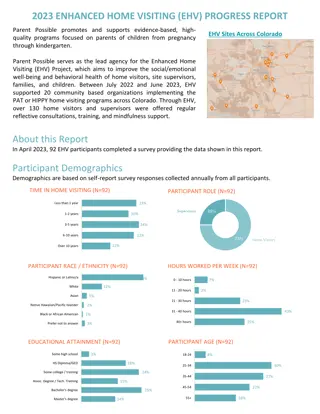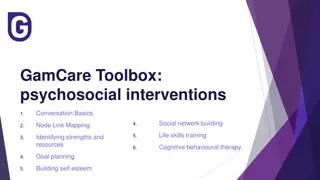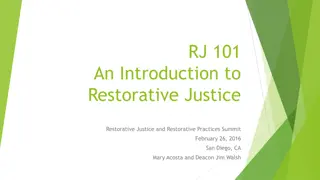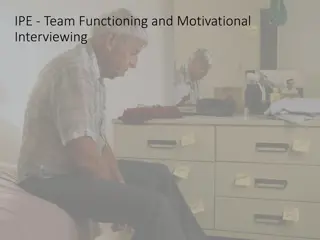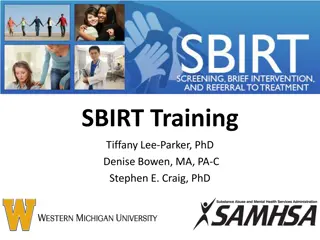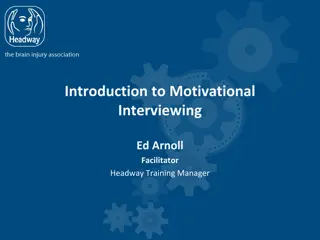Motivational Interviewing Training for Justice-Involved Individuals
"Join the Ohio Justice Alliance for Community Corrections on October 12, 2023, for a session on Motivational Interviewing moderated by Jessica Dennis. Explore key concepts, practice change talk, and enhance your skills in empathy and communication. This training offers valuable insights and practical tools for professionals working with justice-involved individuals."
Download Presentation

Please find below an Image/Link to download the presentation.
The content on the website is provided AS IS for your information and personal use only. It may not be sold, licensed, or shared on other websites without obtaining consent from the author. Download presentation by click this link. If you encounter any issues during the download, it is possible that the publisher has removed the file from their server.
E N D
Presentation Transcript
ITS A WHOLE NEW BALL GAME: MOTIVATIONAL INTERVIEWING FOR JUSTICE INVOLVED INDIVIDUALS Ohio Justice Alliance for Community Corrections October 12, 2023 3:00 pm to 4:30 pm Moderator: Jessica Dennis, Superintendent
TRAINING OBJECTIVES 1. Brief explanations of Motivational Interviewing Concepts. 2. Develop Ability to Recognize and Strengthen Change Talk. 3. Provide Opportunities to Practice Open Questions, Affirmations, Reflections and Summarizations. 4. Expand Understanding of Empathy, Evocation, Acceptance and Compassion. 3
INTRODUCTIONS Lead: Troy Miglets, Parole Officer Assessor Coach: Jacob Popp, Parole Officer Dayton JII: Ashley Autry, Parole Officer Cincinnati
MOTIVATIONAL INTERVIEWING IS NOT THE MAIN COURSE Bookish Unstructured Practice One and Done Technicalities Too removed from Community Correction 5
MOTIVATIONAL INTERVIEWING IS THE GRAVY Menu of trainings Opportunities to practice Coaching Microbursts of MI instruction Staff value opportunities to use MI to enhance ability to supervise individuals. 6
ODRC MOTIVATIONAL INTERVIEWING TRAINING TRACK Prerequisite Training: Online Recording The Spirit of MI The Four Processes of MI Reflective Listening 7
SUSTAIN TALK: ONE SIDE OF AMBIVALENCE Language in favor of staying the same Predictive of non-change Normal Not resistance 8
I DO NOT WANT TO CHANGE I really like marijuana. I need to smoke to be creative. I don t see how I could give up pot. I shouldn't have to quit. 9
CHANGE TALK Increase self-motivation Listen and Encourage 10
CHANGE TALK Desire want, prefer, wish, etc. Ability able, can, could, possible Reason Why do it? What would be good? Need important, must, need to, got to 12
CHANGE TALK I can change. I want to change. I need to change. I should change. 13
BATTING PRACTICE: LISTEN FOR DESIRE, ABILITY, REASON, NEED 1. I could go to group. 2. I don t think I have a problem. 3. I want to control my anger better. 4. All my friends use drugs, why can t I? 5. My kids are the reason that I need to change. 14
BATTING PRACTICE: LISTEN FOR DESIRE, ABILITY, REASON, NEED 6. That neighborhood is bad for me; I need to avoid it. 7. I ve got to find a job. 8. I shouldn t have to avoid my victim. 9. I should stay out of trouble so I can see my kids. 15
Motivational Interviewing Spirit Collaboration Compassion Acceptance Evocation 16
MOTIVATIONAL INTERVIEWING CORE SKILLS Use O.A.R.S. Open-ended questions Affirm strengths, effort, intention Reflect feelings and change talk Summarize 17
BATTING PRACTICE: OPEN ENDED QUESTIONS? 1. What concerns do you have about your drug use? 2. Do you think your anger contributed to this? 3. How would that make things better for your kids? 4. What makes that so important to you? 5. What day were you arrested? 18
BATTING PRACTICE: OPEN ENDED QUESTIONS? 6. What is your court date? 7. What would it take to make that change? 8. Don t you think it s time for a change? 9. How can you ensure that you are successful? 10. Is this an open-ended question? 19
What is Collaboration? Collaboration Compassion Acceptance Evocation 20
COLLABORATION USING OPEN-ENDED QUESTIONS TO EVOKE CHANGE TALK In what way would it be good for you to change? How would your life be different if you made this change? If you did decide to change, what steps would you take? How important is it for you to change? How confident are you that you can change?
BATTING PRACTICE: COLLABORATION USING OPEN- ENDED QUESTIONS In what way would it be good for you to change? How would your life be different if you made this change? If you did decide to change, what steps would you take? How important is it for you to change? How confident are you that you can change?
BATTING PRACTICE Ask Open-ended Questions. The Goal is Collaboration Ask so the person is the expert on themselves Ask about their goals Ask about their ideas Ask about their willingness to change 23
COLLABORATION AND OPEN-ENDED QUESTIONS How do you feel about me giving you some advice? What do you plan to do with this information? 24
ACKNOWLEDGING CHOICE You have different options. It is your choice Would it be okay if I shared some ideas? What is your best choice to move forward 25
ACKNOWLEDGING CHOICE Only you can decide what is best for you. This is a lot to think about. It is important for you to have the opportunity to think things through, so that you can make your own decision. 26
ACKNOWLEDGING CHOICE The decision is yours to make, no one can make it for you. You may or may not be interested in some of these options. Here are examples of what others have tried 27
What is Acceptance? Collaboration Compassion Acceptance Evocation 28
AFFIRMATIONS Promote positive interactions Focus on strengths and efforts Lead to retention Avoid using the word I Genuine and nonjudgmental 29
AFFIRMATIONS Acknowledge the person s ability Acknowledge how hard they are trying Acknowledge a past success they ve had Acknowledge their chances for future success 30
BATTING PRACTICE: AFFIRMATIONS TO SHOW ACCEPTANCE You are taking the necessary steps to You must be a resourceful person to have You have the ability to You are trying hard to You have been successful at You will be successful at LISTENERS: Did you hear acceptance? 31
What is Compassion? Collaboration Compassion Acceptance Evocation 32
REFLECTIONS Repeating their words Restatement with different words Making a guess at their meaning 33
STRATEGIC RESPONSES Use 2 to 3 Reflections for every question 34
FORMING REFLECTIONS Make a guess about what the person means. It s okay to guess wrong. Form a statement, not a question. Inflect your voice down at the end. A reflection is typically not longer than the statement. 35
REFLECTION EXAMPLES You see a connection between your drug use and the possibility of ending up back in prison. (CONTENT) You are worried that if you continue using you might end up back in prison. (FEELING) Your children are important to you, and you want to be there for them. (MEANING) 36
BATTING PRACTICE: REFLECTIONS Restate using different words Restate feelings Restate beliefs Restate attitudes Take a guess at what the person means Take a guess at what the person feels 37
What is Evocation? Collaboration Compassion Acceptance Evocation 38
SUMMARIES Let the Individual know that you are going to summarize Pull out 3 points about what the Individual said Let me see if I have this right 39
SUMMARY EXAMPLE Okay Let me see if I have this right, You started shoplifting for extra money, shoplifting has cost you more than it was worth, and made less than your current job. 40
BATTING PRACTICE: EVOCATION USING SUMMARIES Let me see if I have this right Collect 3 things about what was said Listener: Do you think this would lead an Individual to talk about change? 41
Motivational Interviewing Spirit Collaboration Compassion Acceptance Evocation 42
QUESTIONS? 43
CONCLUSION 1. Motivational Interviewing Concepts. 2. Ability to Recognize and Strengthen Change Talk. 3. MI Spirit: Empathy, Evocation, Acceptance and Compassion. 4. Practiced OARS with a Coach. 44
FEEDBACK 45
CONTACT INFORMATION Jessica.Dennis Ashley.Autry Jacob.Popp Troy.Miglets @odrc.state.oh.us 46



